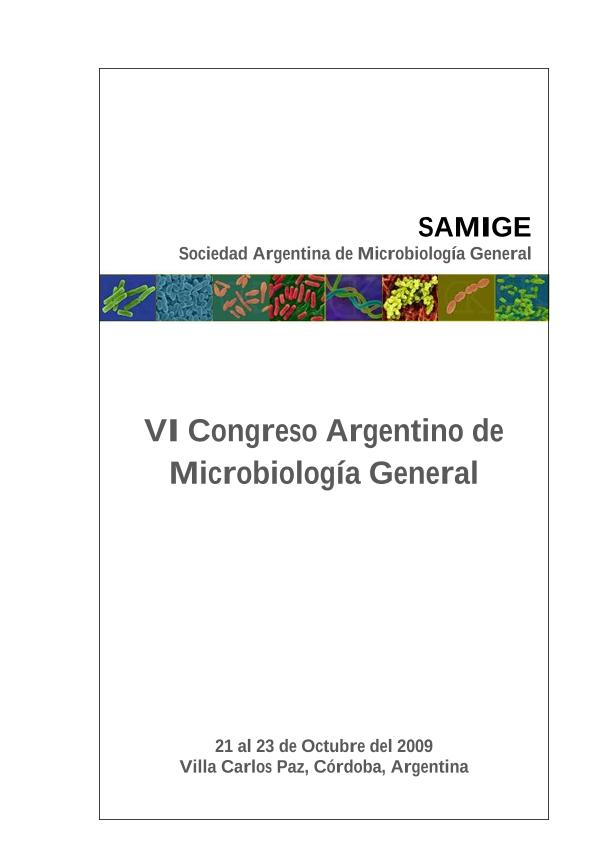Mostrar el registro sencillo del ítem
dc.contributor.author
Rodriguez Prado, Macarena
dc.contributor.author
Muruaga, María Laura

dc.contributor.author
Perotti, Nora Ines

dc.contributor.author
Abate, Carlos Mauricio

dc.date.available
2023-04-21T18:11:41Z
dc.date.issued
2009
dc.identifier.citation
Selection and identification of ethanol hiperproducer yeasts from sugar cane molasses; VI Congreso Argentino de Microbiología General; Carlos Paz; Argentina; 2009; 112-112
dc.identifier.uri
http://hdl.handle.net/11336/195002
dc.description.abstract
The decrease of the petroliferous stock and gas in the world, coupled with environmental pollution and global warming, caused mainly by the excessive use of such fuels has generated the need for further studies to become feasible to use new energy sources. The bioethanol consumption produce lower evaporative emissions due to its higher octane concentration and vapor pressure in consequence the pollution levels are much lower than the observed with fossil fuels. The entry into force of Law 26,093 of biofuels in Argentina from 2010 will mean an opportunity for the sugar sector to expand ethanol production to supply 5% of it to all the naphthas. In that regard, Tucumán has a privileged position since its large capacity of ethanol production associated to sugar mills. Our work proposes a microbiological approach to use fermentative microorganisms with high tolerance to alcohol in order to increase ethanol concentration of 11% that is currently obtained in the factories by the alcoholic fermentation of molasses. To take up this, isolation and identification of ethanol hyper-producer strains of yeasts from sugar cane molasses was addressed. Molasses samples were taken from different sugar factories of Tucuman and used to inoculate YPS and YPD media with antibiotics. The microorganisms were inoculated in YPS medium with 50g/L sucrose, incubated at 30ºC with agitation. The fermentations assays were carried out in Erlenmeyers flasks with 200 ml of YPS with 250 g/L of sucrose and incubated at 30 ºC without aeration. Total and direct reducing sugars, biomass and ethanol concentration were determined. Three isolates were selected by your high ethanol production and named as A2, A10 and A11, which produced 11.74, 12.81 and 13.20% of ethanol, respectively. The isolates were identified by sequence analysis of their ARNr 28S intergenic spacer sequences, which allowed assigning identities of 99 and 100% to Saccharomyces cerevisiae. Promising results obtained with isolates A10 and A11 justify further studies leading to an optimization of bioethanol production.
dc.format
application/pdf
dc.language.iso
eng
dc.publisher
Sociedad Argentina de Microbiología General
dc.rights
info:eu-repo/semantics/openAccess
dc.rights.uri
https://creativecommons.org/licenses/by-nc-sa/2.5/ar/
dc.subject
ETHANOL
dc.subject
YEAST
dc.subject
BIOETHANOL
dc.subject.classification
Bioproductos, Biomateriales, Bioplásticos, Biocombustibles, Bioderivados, etc.

dc.subject.classification
Biotecnología Industrial

dc.subject.classification
INGENIERÍAS Y TECNOLOGÍAS

dc.title
Selection and identification of ethanol hiperproducer yeasts from sugar cane molasses
dc.type
info:eu-repo/semantics/publishedVersion
dc.type
info:eu-repo/semantics/conferenceObject
dc.type
info:ar-repo/semantics/documento de conferencia
dc.date.updated
2023-04-19T19:04:32Z
dc.journal.pagination
112-112
dc.journal.pais
Argentina

dc.description.fil
Fil: Rodriguez Prado, Macarena. Consejo Nacional de Investigaciones Científicas y Técnicas. Centro Científico Tecnológico Conicet - Tucumán. Planta Piloto de Procesos Industriales Microbiológicos; Argentina
dc.description.fil
Fil: Muruaga, María Laura. Consejo Nacional de Investigaciones Científicas y Técnicas. Centro Científico Tecnológico Conicet - Tucumán. Planta Piloto de Procesos Industriales Microbiológicos; Argentina
dc.description.fil
Fil: Perotti, Nora Ines. Consejo Nacional de Investigaciones Científicas y Técnicas. Centro Científico Tecnológico Conicet - Tucumán. Planta Piloto de Procesos Industriales Microbiológicos; Argentina. Universidad Nacional de Tucumán. Facultad de Ciencias Exactas y Tecnología; Argentina
dc.description.fil
Fil: Abate, Carlos Mauricio. Consejo Nacional de Investigaciones Científicas y Técnicas. Centro Científico Tecnológico Conicet - Tucumán. Planta Piloto de Procesos Industriales Microbiológicos; Argentina. Universidad Nacional de Tucumán. Facultad de Bioquímica, Química y Farmacia; Argentina
dc.relation.alternativeid
info:eu-repo/semantics/altIdentifier/url/https://samige.org.ar/wp-content/uploads/2022/10/Libro-SAMIGE-2009.pdf
dc.conicet.rol
Autor

dc.conicet.rol
Autor

dc.conicet.rol
Autor

dc.conicet.rol
Autor

dc.coverage
Nacional
dc.type.subtype
Congreso
dc.description.nombreEvento
VI Congreso Argentino de Microbiología General
dc.date.evento
2009-10-21
dc.description.ciudadEvento
Carlos Paz
dc.description.paisEvento
Argentina

dc.type.publicacion
Book
dc.description.institucionOrganizadora
Sociedad Argentina de Microbiología General
dc.source.libro
Resúmenes del VI Congreso Argentino de Microbiología General
dc.date.eventoHasta
2009-10-23
dc.type
Congreso
Archivos asociados
